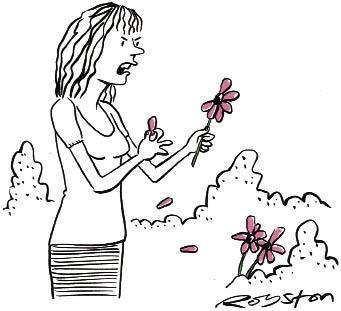Choosing frames for my new varifocal lenses was like choosing a new personality. Each pair I tried on projected something slightly different. What kind of person should I pretend to be from now on? Philosophical? Whacky? Left-leaning? Post post-modernist? It was an unexpectedly exciting moment.
The young assistant stood with me at the display and offered her professional opinion. In quick succession I popped on a couple of dozen different frames and looked into her eyes and tried to be serious. She knew immediately whether or not a particular pair of frames suited my face. If they did, and she liked them, she shook her fingers as though she’d just burnt them on a hotplate. Presumably this meant they were ‘hot’ or, perish the thought, that they made me look ‘hot’. If she thought the frames suited but were boring, she let her eyelids droop, as if she were about to fall asleep on the spot. If she didn’t like them, or they suited me not at all, she pretended to have a mouthful of vomit and to be frantically casting about for somewhere to throw up.
Only one pair left her in a quandary: the ones I kept returning to, the heavy black retro frames. I’d seen them in newspaper obituary photographs taken in the 1950s of the faces of colonial administrators. The disgraced Conservative Chancellor of the Exchequer Reginald Maudling wore something very similar. And Ronald Kray wore a pair when he was allowed out for the day from Broadmoor to attend his mum’s funeral at Chingford cemetery. The designer frames were theatrical without being ridiculous, but only just. The personality projected was one of assiduous depravity. In a British film, they’d be the kind of glasses worn by a sadistic paedophile.
The assistant wasn’t sure about these. She sucked in her lips and gave me the level, downward-facing, wobbling-palms gesture. (It was like going shopping with Marcel Marceau. Had she been deaf at one time in her life? I wondered.) Well, it was either these, I said, or these — and I took off the Reginald Maudlings and put on my second choice, an oblong, hyper-serious, ultra-light, It’s-Grim-Up-North-London kind of a frame. She took one look at the latter and started to nod off again.
The opticians was a large, bustling, city-centre shop. The assistant led me around the floor canvassing opinion on my Reginald Maudlings. Everyone we asked immediately dropped whatever they were doing and gave their considered opinion. Far from being annoyed about being interrupted, they were all glad to be asked. Working in an opticians might be, by and large, a repetitive job, but it seems that pandering to a customer’s foolish vanity, by giving his chosen pair of spectacle frames either the thumbs up or the thumbs down, never stales. On the whole, the verdict was favourable.
For a final decision, the assistant said she’d go and fetch a colleague who could always be relied on to ‘tell it how it is’. Then she disappeared through a ‘staff only’ door at the back of the shop. She was gone for a long time. I assumed it was because honesty was such a rare and controversial commodity these days that the colleague was confined in an obscure room, possibly manacled, and that numerous forms and waivers had to be filled out before she could be allowed into the public arena to unleash another of her devastating judgments.
Finally she reappeared through the ‘staff only’ door with this famously truthful colleague. I was expecting to be presented to some hatchet-faced old graduate of the school for hard knocks. But this woman had a kind, untroubled face. She was of an older generation than anyone I’d met so far. Perhaps anybody born and raised before the political-correctness revolution, and still working, will inevitably have a reputation for outspokenness.
The assistant led her over and introduced me to her. Then she retreated a step, screwed up her eyes and raised a protecting shoulder, as if expecting flying debris. I snapped on the Reginald Maudlings and stood erect. The colleague with the reputation for telling it like it is looked appraisingly at my face. I watched her mild eyes follow the outline of my features and come to rest finally on the frames. ‘With a big conk like that, he might be better off with brown,’ she said. ‘But the style suits him well. In fact, he might look almost handsome,’ she added, ‘to someone galloping by on a horse.’







Comments